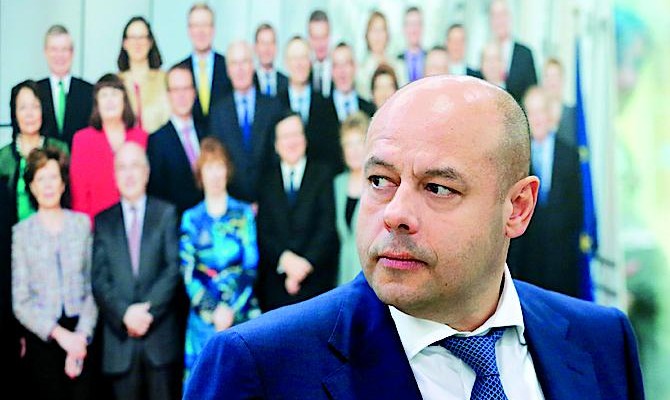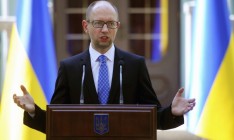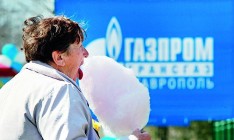Business
stuporUkraine and Russia maintain positions in gas talks – reverse vs. no reverse?

The gas negotiations that were held in Brussels last Tuesday demonstrated the uncompromising attitudes of Ukraine and Russia on this delicate issue. Gazprom insists that gas supplies should be preceded by the repayment of debts and the price should be set on the basis of the existing contract and discounts, while Ukraine demands the signing of a new gas contract that should stipulate new terms.
Talking behind one’s back
At the talks held in Brussels on October 21, Ukraine, Russia and the European Commission agreed only that by March 2015 Ukraine would buy 4 bn cu m of Russian gas at US $385 per 1,000 cu m and that it will be received on pre-payment terms, while “take or pay” principle will not be applicable. These results of the trilateral meeting were announced by the EU Energy Commissioner Guenther Oettinger.
Interestingly enough, each of the sides publicly evaluated the results of the talks in their own way. While the EU commissioner spoke more about the positive side, Minister of the Energy and Coal Industry of Ukraine Yuriy Prodan and Minister of Energy of Russia Alexander Novak mostly pointed out disagreements.
Prodan said that for the resumption of gas supplies interrupted back on June 16 Ukraine would pay a maximum of US $3.1 bn: by the end of October Naftogaz would pay US $1.45 bn and another US $1.65 bn by the end of this year. In this case, the Ukrainian side insists that the results of arrangements should be stipulated in a legally binding document, i.e. a new or additional agreement so that the Russian side cannot raise the price unilaterally. Novak pointed out that Ukraine owes US $5.3 bn for gas and nobody is prepared to sign any legally binding documents. The Russian delegation is convinced that a decision of its government is sufficient for consolidation of new price conditions.
Therefore, the basic positions of the Russian and Ukrainian sides have not fundamentally changed after they were reported by Capital on October 2. The only exception is that perhaps the size of the tranches for debt repayment has changed: earlier Russia demanded repayment of US $2 bn by the end of October and another US $1.1 bn by the end of the year, but now the two sides agreed on the ratio of US $1.45 bn and US $1.65 bn, respectively.
Gazprom has objections
“There is no particular progress in the negotiations,” believes Co-chair of the Energy Strategies Foundation Dmytro Marunych. But there was a precedent. The Russian side officially stated that it would not allow Ukrainian consumers to kick its gas needle.
Oettinger said that European companies could act as intermediaries in Ukraine’s purchase of gas. He said they can buy fuel from Gazprom on the border between Russia and Ukraine and then sell it to Naftogaz. Naturally, in such a case the key question is how much Europeans will have to pay for the purchase of gas for Ukraine. According to Oettinger, this may be a matter of the aforementioned 4 bn cu m, but the volume should be clarified. The fact is that European side is not willing to pay more than it should and wants to check Ukraine’s financial wherewithal to pay for the gas. “We will make a final decision only after a thorough inspection of the financial situation of Naftogaz and the state budget of Ukraine after contacts with the IMF and taking into consideration the financial assistance programs from the EU, which have already been set into motion and those that are planned for implementation this year,” Oettinger stressed.
So, it will be possible to implement the notion of the so-called virtual reverse, when gas is physically supplied directly from the Russian pipeline to Ukrainian consumers and legally and commercially – from Western traders.
Nevertheless, Prodan said the Russian monopoly rejected the offer. “Gazprom replied that such a supply pattern is impossible. No explanations followed,” said the minister.
No cash, no gas…
The main reason for the lack of progress in the gas talks with Russia is the lack of Ukraine’s resources to pay for the commodity, believes Marunych. “The reason is trite – we have no money. Or to be more precise, we have enough money but only for one thing: either the repayment of gas debts or the pre-payment for future supplies,” he explained.
Earlier, Premier Arseniy Yatsenyuk said Ukraine had US $3.1 bn to pay for gas, but Marunych doubts that the entire amount is available. “Most likely a part of the aforementioned US $3 bn has already been used for an advance payment for gas supplies from Europe for the period of September-October. According to assessment Ukraine was supposed to pay approximately US $1 bn for September-October alone,” he stressed.
The expert noted that the collection of funds from consumers for gas supplies to Naftogaz of Ukraine has been blocked – in August 2014 the gas industry reduced consumption by 39% compared to the same period last year and total gas consumption in the country dropped this month by 30%.
Close friendship
Against the background of intense negotiations with Russia, Ukraine decided to make another attempt to work more closely with Europe on gas issues. Yesterday, representatives of Naftogaz of Ukraine said the company appealed to Eustream, an operator of the Slovak gas transit system (GTS) with a proposal to arrange a “great reverse” of gas that would help increase the volumes of gas transported to Ukraine. When Ukraine was denied the alternative of virtual reverse, it decided to increase the volume of physical reverse flow supplies.
At the same time, Naftogaz of Ukraine noted that the Vojany–Uzhzorod pipeline (with an approximate capacity of 10 bn cubic m per year through which Ukraine currently receives European gas is already loaded to the maximum. The Ukrainian company proposed signing of direct contracts to merge networks (interconnect) with Eustream and GTS operators in neighboring EU countries. For deliveries to Ukraine Naftogaz wants to use the pipeline currently used to transport fuel only in the western direction. However, the “great reverse” is blocked by the export of Gazprom, which signed a contract with Eustream under which the four lines of the Ukrainian–Slovak stretch of the pipeline can be used to transport only gas that belongs to Gazprom.






 of the agreement of syndication with Financial Times Limited are strictly prohibited. Use of materials which refers to France-Presse, Reuters, Interfax-Ukraine, Ukrainian News, UNIAN agencies is strictly prohibited. Materials marked
of the agreement of syndication with Financial Times Limited are strictly prohibited. Use of materials which refers to France-Presse, Reuters, Interfax-Ukraine, Ukrainian News, UNIAN agencies is strictly prohibited. Materials marked  are published as advertisements.
are published as advertisements.